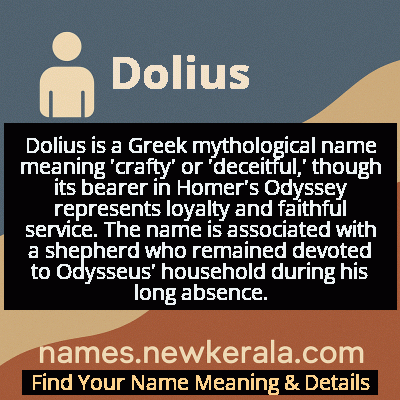Dolius Name Meaning & Details
Origin, Popularity, Numerology Analysis & Name Meaning of Dolius
Discover the origin, meaning, and cultural significance of the name DOLIUS. Delve into its historical roots and explore the lasting impact it has had on communities and traditions.
Name
Dolius
Gender
Male
Origin
Greek
Lucky Number
8
Meaning of the Name - Dolius
Dolius is a Greek mythological name meaning 'crafty' or 'deceitful,' though its bearer in Homer's Odyssey represents loyalty and faithful service. The name is associated with a shepherd who remained devoted to Odysseus' household during his long absence.
Dolius - Complete Numerology Analysis
Your Numerology Number
Based on Pythagorean Numerology System
Ruling Planet
Saturn
Positive Nature
Ambitious, efficient, realistic, and authoritative.
Negative Traits
Materialistic, stressed, confrontational, and can be overly ambitious.
Lucky Colours
Dark blue, black.
Lucky Days
Saturday.
Lucky Stones
Blue sapphire, amethyst.
Harmony Numbers
2, 4, 6.
Best Suited Professions
Business leaders, managers, financial services, law enforcement.
What People Like About You
Leadership, determination, organizational skills.
Famous People Named Dolius
Dolius of Ithaca
Mythological Shepherd
Remained loyal to Penelope and helped Odysseus defeat the suitors upon his return
Dolius the Elder
Literary Character
Father figure in Homeric tradition representing generational wisdom and rustic values
Dolius (Historical)
Ancient Greek Farmer
Recorded in Athenian archives for agricultural innovations and land management
Name Variations & International Equivalents
Click on blue names to explore their detailed meanings. Gray names with will be available soon.
Cultural & Historical Significance
The name also connects to broader pastoral themes in Greek literature, where shepherds often symbolized the ideal of the simple, honest life close to nature. In philosophical traditions, particularly Stoicism and Cynicism, the shepherd's life was sometimes held up as a model of self-sufficiency and moral purity. Dolius's characterization aligns with these ideals, presenting a figure whose worth comes not from social status but from moral character and faithful service. This cultural significance has ensured the name's preservation in classical studies and mythological scholarship, though it never achieved widespread popularity as a given name.
Extended Personality Analysis
Individuals bearing the name Dolius typically exhibit a complex blend of humility and inner strength. They are characterized by exceptional loyalty and dependability, often serving as the moral compass in their social circles. Their practical wisdom, gained through observation and experience rather than formal education, makes them excellent problem-solvers who approach challenges with patience and careful consideration. Like their mythological counterpart, they possess a deep sense of duty and will endure significant hardship to fulfill their commitments to others.
These individuals often demonstrate remarkable emotional resilience and the ability to maintain their principles in the face of adversity. They tend to be perceptive judges of character, though they may keep their assessments private until necessary. While not naturally seeking leadership positions, they often become trusted advisors and confidants due to their discretion and reliability. Their strength lies in their consistency and the quiet confidence that comes from living according to deeply held values. They typically form strong bonds with family and close friends, demonstrating protective instincts and unwavering support for those they care about.
Modern Usage & Popularity
In contemporary naming practices, Dolius remains an extraordinarily rare choice, primarily confined to academic families, classical scholars, and enthusiasts of Greek mythology. Its usage is almost nonexistent in mainstream naming trends, with no recorded instances in modern birth registries of English-speaking countries. The name occasionally appears in historical fiction or as a character name in works inspired by classical literature, but it has not experienced the revival seen with other mythological names like Orion or Athena. Current usage patterns suggest it may be employed as a middle name more frequently than a first name, often paired with more conventional given names. The name's strong association with servitude in its mythological context may contribute to its limited modern appeal, despite its positive connotations of loyalty and integrity.
Symbolic & Spiritual Meanings
Symbolically, Dolius represents the enduring power of loyalty and the virtue of steadfast service. The name embodies the concept that true worth is measured not by social position but by moral character and reliability. It symbolizes the pastoral ideal of living in harmony with nature while maintaining traditional values and ethical principles. As a mythological figure who remained true to his masters despite twenty years of absence and the corrupting influence of the suitors, Dolius represents the triumph of integrity over convenience and the importance of maintaining one's principles through difficult circumstances.
The name also carries connotations of generational wisdom and the transmission of traditional knowledge. As an elderly shepherd, the mythological Dolius represents the value of experience and the importance of preserving cultural and practical knowledge across generations. Symbolically, the name suggests that those who appear humble or occupy modest positions may possess the greatest moral strength and play the most crucial roles in preserving social order and ethical standards.

